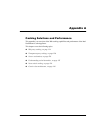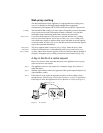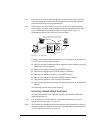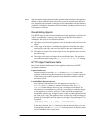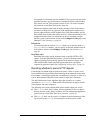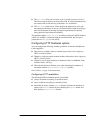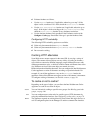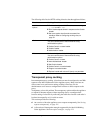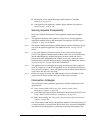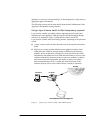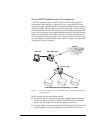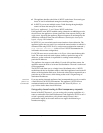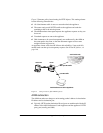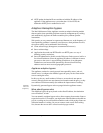
Appendix A Caching Solutions and Performance 119
✔ Evaluate freshness as follows:
1 Use the Expires header test, if applicable, otherwise go to step 2. If the
object is stale, revalidate. If it is fresh, check the Cache-Control headers.
2 Use the Last-Modified / Date header test, if applicable, otherwise go to
step 3. If the object is fresh according to the Last-Modified / Date test,
check the Cache-Control headers for any freshness restrictions.
3 Use the absolute freshness limit specified in the Freshness section of the
Configure: Cache page. Revalidate if the age is past the freshness limit.
Configuring HTTP cachability
The following HTTP cachability options are available:
✔ Cache only documents that have Expires headers
✔ Cache only documents that have Expires or Last-Modified headers
✔ Do not restrict caching
Caching HTTP alternates
Some Web servers answer requests for the same URL by serving a variety of
objects. The content of these objects can vary widely, according to whether a
server delivers content for different languages, targets different browsers with
different presentation styles, or delivers variable content at different times of the
day. Different versions of the same object are termed alternates.
Header information identifies alternates. You can configure the Intel NetStructure
Cache Appliance to cache all alternates according to a particular header. For
example, if you tell the appliance to vary on the User-Agent header, the
appliance caches all the different user-agent versions of documents it encounters.
To configure caching of alternates, see Variable content‚ on page 38.
To cache or not to cache?
Depending on the type of object, you can direct the Intel NetStructure Cache
Appliance to cache or not cache an object:
NNTP You can limit article caching to specific news groups. See Blocking particular
groups‚ on page 140.
FTP You can configure never-cache rules for specific types of FTP documents by
using the command-line interface. See Configuring caching rules‚ on page 79.
HTTP The appliance responds to caching directives from clients and origin servers, as
well as configured options in the Manager UI and the command-line interface.





